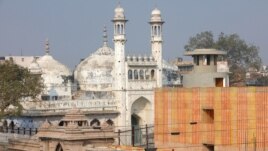01 June 2022
In the city of Varanasi, India, Muslims and Hindus have shared a place of prayer for almost three hundred years which is separated by only a wall.
On one side, there is a mosque for Muslims. On the other side, there is a Hindu temple. Until a month ago, the place was considered an example of how the two religions can exist together in an area marked by conflict.
Now groups of Hindus want to pray inside the Gyanvapi mosque area. They have asked a local court to hear their case. Their argument is that the mosque was built on the ruins of an old Hindu temple that was destroyed by a Mughal emperor hundreds of years ago. They say the mosque area has Hindu statues inside. But the mosque's leaders disagree.

FILE - A worker stands on a temple rooftop adjacent to the Gyanvapi Mosque in the northern city of Varanasi, India, December 12, 2021. (REUTERS/Pawan Kumar/File Photo)
The legal case is the most recent example of nationalist Hindu groups demanding land that they say belongs to them. They believe thousands of mosques were built on top of Hindu temples. Historians say that these numbers are overstated. They say only a small number of temples were destroyed for political reasons, not religious ones.
India is officially a secular country. But Hindu nationalists have tried to make India into a religious country. Religious minorities, like Muslims, have come under attack.
Legal cases have increased fear within Muslim populations about their religious centers.
In 1992, a crowd of Hindu nationalists destroyed the Babri mosque built in the 1500s. The destruction led to violence between Muslims and Hindus, leaving more than 2,000 people dead. Most were Muslim.
Nilanjan Mukhopadhyay is an Indian political expert. He said that bringing many cases before the courts is a way to keep the Muslims from showing their religion in public and that their faith is no longer accepted.
The two communities in Varanasi disagreed, but they did not let the disagreement worsen until last week. The local court ordered the Gyanvapi mosque to be inspected after five Hindu women asked the court for permission to pray there.
The lawyer of the five women, Hari Shankar Jain, said there was video evidence that a stone object inside the mosque was a representation of the Hindu god, Shiva. It was found inside a water pool used by Muslims to purify themselves before prayers.
"The land on which the mosque is built belongs to Hindus and should be returned to us," Jain said.
The local courts ordered the mosque blocked off and banned Muslims from gathering there. India's Supreme Court overturned the lower court's ruling. But it still blocked the area where the stone rests, leaving part of the Mosque unavailable to Muslims.
Now a higher court in Varanasi has taken up the case.
The leaders of the mosque have questioned the legal claims and said that the stone area was the base of a fountain. Lawyers for the Muslim side have said that these actions against the mosque are illegal because of a 1991 law called the Places of Worship Act. It says any religious area should be kept as such and not changed from the day that India won its freedom from Britain, on August 15, 1947.
More and more cases end up in court as Hindu citizens ask to pray in mosques around the country. This has helped Prime Minister Modi's nationalist party in their campaign to support Hinduism.
A lawyer for the Gyanvapi mosque, Nazim Pasha, said these actions are a careful pattern meant to gain the support of Hindu nationalists.
I'm Caty Weaver.
And I'm Faith Pirlo.
Saaliq and Krutika Pathi reported this story for the Associated Press. Faith Pirlo adapted it for VOA Learning English.
_______________________________________________________________________
Words in This Story
mosque — n. a building that is used for Muslim religious services
temple –n. a building for worship or religious observance
emperor -n. a man who rules an empire
secular – adj. not religious: of or relating to the physical world and not the spiritual world: of, relating to, or controlled by the government rather than by the church
faith – n. the belief that something is good, right and able to be trusted; also in reference to a religion
fountain – n. a structure or device that provides water that, in some cases, sends a stream of water into the air
worship – v. to show respect and love for God or for a god especially by praying, having religious services, etc.
pattern– n. something that happens in a repeated way